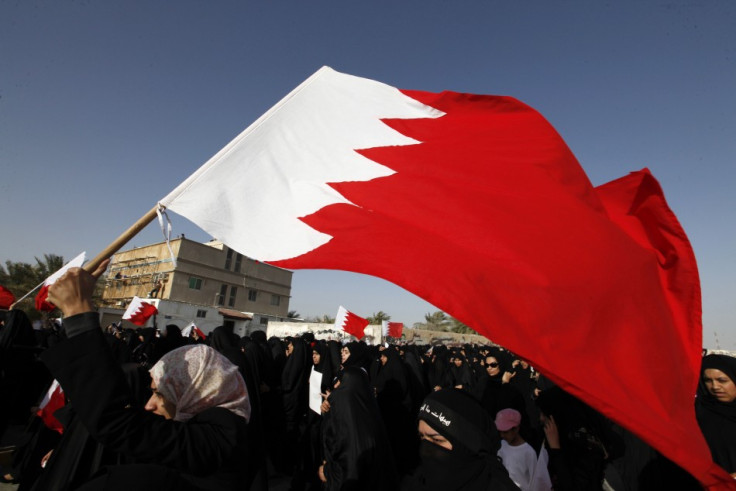Bahrain: Protests Press Cause Of Arab Spring's Forgotten Revolution

As supporters of the Bahraini opposition march in Lebanon and Iraq, the United Nations has voiced concern over the regime's use of tear gas on protesters.
On Monday, Bahraini opposition activists staged a sit-in outside the headquarters of the United Nations Economic and Social Commission for Western Asia (UN-ESCWA) in Beirut.
The rally was staged in support of Bahrain's opposition and its calls for an elected government.
The demonstrators called on the international community to "shoulder its historic responsibilities regarding this illegitimate interference, which represents a blatant occupation."
The participants also submitted a letter to U.N. Secretary General Ban Ki-moon demanding Saudi forces quit Bahrain because their presence "violates the U.N. Charter's articles pertaining to countries' sovereignty," Now Lebanon reported.
"[We call] for launching a serious investigation into the violations that the Saudi forces were involved in, such as demolishing mosques and violating religious freedoms," the letter further demanded.
Bahrain's mass protests in February and March 2011 were brutally repressed by the regime.In March of the same year Saudi Arabia sent troops to assist the Bahraini government.
In Iraq, more than 2,000 Shia demonstrators led by cleric Muqtada al-Sadr also staged a protest in support of Bahrain's opposition on March 9, demanding regime change in the small Gulf state.
On Monday, a rally in Basra marking the ninth anniversary of the U.S. invasion of Iraq also heard calls against the Bahraini regime.
UN Response
A day after the demonstrations in Iraq and Lebanon, the U.N.'s human rights office expressed concern Tuesday about the deaths of protesters in Bahrain after security forces used tear gas, reported to number more than 30. Activists say security forces continue to use the chemical weapons in residential areas to intimidate the populace.
The U.N. human rights office said it will send an expert team to Bahrain at the end of the month for talks with the government.
Bahrain: A Forgotten Revolution?
Demand for political reform in Bahrain is not new, but as the Arab Spring gained pace in 2011, the opposition movement started to take to the streets en masse.
The uprising began with demands for more democracy and freedom, and following months of crackdown slogans calls for the prime minister to step down are becoming more recurrent. Prime Minister SheikhKhalifa bin Salman al-Khalifa was appointed by the late KingIsa bin Salman al-Khalifa, his brother, in 1971, and is the current king's uncle.
The kingdom, with a majority of Shia Bahraini nationals, is ruled by a Sunni Muslim monarchy. The regime has portrayed the opposition as instigating sectarian strife, helped by enemy Shia powers Iran and Hezbollah, but opposition parties like al-Wefaq have denied the charge repeatedly.
Bahrain's repression of the uprising was documented by the Bahraini Independent Commission of Inquiry and activists say abuses, including torture, excessive use of tear gas and intimidation campaigns against dissidents, continue.
The government denies the accusations, and the king organised a ceremony Tuesday to mark the completion of the independent panel's recommendations. But Bahraini rights groups say most of the recommendations have not been implemented and lament they have received little support from the international community, especially in comparison to the uprisings in Egypt, Libya, Syria or Tunisia.
"If you look at the press coverage that protests in Bahrain or even Yemen have received, compared to the uprisings in Libya or Egypt, it is completely uneven. A few years ago, Yemen was at the forefront of the international agenda because of the fear of al Qaeda, but this year very little attention has been given to the troubled country, despite al Qaeda still being there," Khalil Almarzooq, the political assistant to Al-Wefaq's secretary-general, told IB Times UK.
"It angers me when I see reports only describing us as Shia protesters. Do the international community see us as Bahraini citizens or just as Shia and Sunni Muslims? Opposition protesters are Bahraini nationals and as such have a right to have their demands heard. We have the right to have an elected government."
"As protests grew in other Arab Spring countries, foreign powers ended up calling for the rulers to step down to calm unrest, but in the case of Bahrain they have and continue to side with the regime " Almarzooq continued.
Asked why the international community has taken such an attitude, he replied, "It all depends on the strategic interest in play, and clearly for now foreign powers seem to see their interest best served by the regime despite its crackdown on people."
Bahrain is the home base of the U.S. Navy's Fifth Fleet.
© Copyright IBTimes 2025. All rights reserved.





















